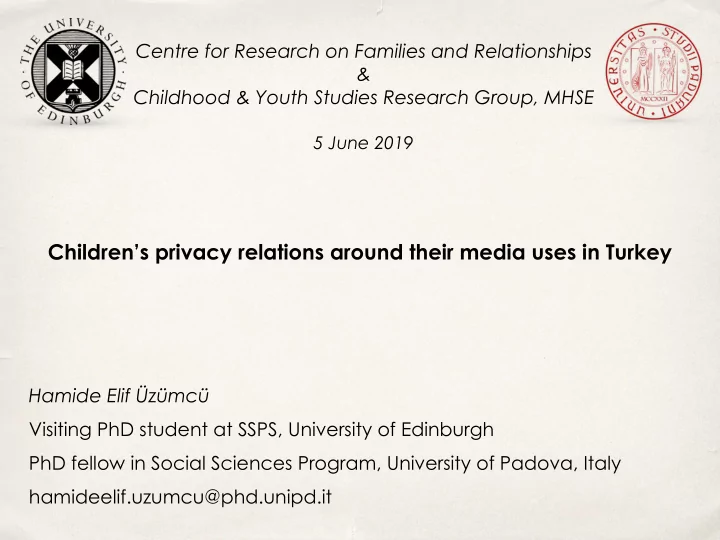

Centre for Research on Families and Relationships & Childhood & Youth Studies Research Group, MHSE 5 June 2019 Children’s privacy relations around their media uses in Turkey Hamide Elif Üzümcü Visiting PhD student at SSPS, University of Edinburgh PhD fellow in Social Sciences Program, University of Padova, Italy hamideelif.uzumcu@phd.unipd.it
Conceptual Framework Management of contact when desired Privacy (Altman, 1975; Westin, 1967) Control over access to information (Schoeman, 2007; Petronio, 2002; Wynne, 1976)
Aims This research aims to explore ‣ how children’s privacy is treated within families in Turkey ‣ how parents intervene in children’s online and indoor private lives ‣ how children construct boundaries around their privacy
Aims
Aims Consumption Children’s access to media contents Management Production Children’s production of media contents of contact Children’s use of media of tools as a Interaction medium of communication Surveillance over children’s media Consumption contents consumed Surveillance over children’s media Information Production disclosure contents produced Surveillance over children’s digital Interaction interactions
Method Qualitative method: Participatory observational fieldwork In depth interviews and informal revisits 33 families living in the city of Eski ş ehir in Turkey: ➡ children aged 11 to 13 (n=33) ➡ their parents (n=37) ➡ their siblings (n=24)
Method
1. Children’s managing contact when desired: Interaction Parents’ side: I gave her cell phone back on one condition. We had actually taken it from her for 15 days or so. She should not have used the social media… Because she is not able to sustain self-control. She was supposed to use only Whatsapp. So, I took her sim card out and kept it . (Father, 45, Self-employed, Eski ş ehir, 2018) Now we live in a such an age that we bought this cell phone for her. But her phone bill was too high and that was our excuse (to take her phone from her)… Now we are considering to convert it into pay-as-you-go. We need her to have a phone to contact with her, because the neighborhood is bad. Monitoring her is hard! (Mother, 42, Self-employed, Eski ş ehir, 2018)
1. Children’s managing contact when desired: Interaction Children’s side: “ … Instagram suggested me another account of Ecrin tonight*: “Ecrinkacar_yedek” was her nickname which literally means “Ecrin Kaçar’s_alternative_account”. She put a selfie on the profile, which was filtered with bunny ears and nose. She had 0 post, but 63 followers and was followed 23 friends. ” ( Field notes, Kaçar Family, Eski ş ehir, 2018) *Pseudonym was used.
2. Children’s control over access to their information: Consumption Parents’ side: We let her take her phone at certain hours. But this does not stop her. Because she -for example takes my phone, takes her father’s phone. She takes it and says she will call someone. With these sorts of excuses, she goes into social media and shares posts. She gave her password to her friends and her friends share posts on behalf her. My husband knows how to use this technology, so he can monitor her. I don’t get involved with monitoring as I don’t know how the technology works. (Mother, 42, Self-employed, Eski ş ehir, 2018)
2. Children’s control over access to their information: Consumption Children’s side How about your parents? What do they think about your relation with your phone? They say I am addicted… What do you think? Well, I think so. I just can’t hold myself back! Why do you think you are addicted? I overstay online. For example, before I got punished, my phone bill was too expensive. It charged 400 Turkish Liras! […] They took my sim card from me, so that I could study better. My course grades in Science were bad last year, for example. I used to get 60 points. I got 60 points four times in a row. Then they took my cell phone from me. I studied well for the Science exam and I got 98. So, it actually worked in that sense. (Female, 11, 6th grade student, Eski ş ehir, 2018)
Conclusion ‣ Relation between parental authority & privacy ‣ Children’s resistances and strategies to guard their privacy ‣ Children’s reflections on parental surveillance
References Altman, I. (1975). The environment and social behavior: Privacy, personal space, territory and crowding. Monterey, CA.: Brooks/Cole. Mayer, B., Trommsdorff, G., Ka ğ ıtçıba ş ı, Ç. and Mishra, R. C. (2012). Family models of independence/interdependence and their generational similarity in Germany, Turkey and India. Family Science , 3 (1): 64-74. Petronio, S. (2002). Boundaries of privacy: Dialectics of disclosure. New York: State University of New York Press. Schoeman, F. D. (2007). Privacy: Philosophical dimension of the literature. In F. D. Schoeman (Ed.), Philosophical dimensions of privacy: An anthology (pp. 1-33). New York: Cambridge University Press. Sunar, D. and Fi ş ek, G. O. (2005). Contemporary Turkish families. In U. Gielen and J. Roopnarine (Eds.), Families in global perspective (pp. 169-183). Boston: Pearson. Wynne, E. (1976). Adolescent alienation and social policy. Teachers College Record, 78: 33-39.
Recommend
More recommend